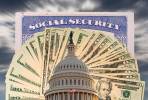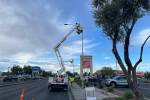More Cops means more cops
Oh, for the days of 2004. When jobs were abundant. When voters had enough confidence in the security of their income to support tax increases for targeted purposes.
That fall, Southern Nevada voters narrowly approved an advisory question to increase Clark County’s sales tax rate half a percentage point, in two quarter-point increments, to put more police on the streets. Hence, Question 9 was known as the “More Cops” campaign. The Review-Journal had enough concerns about public safety amid explosive population growth to endorse the initiative.
The first quarter-cent tax hike arrived almost immediately. The second quarter-cent increase, due in 2009, never happened. By then, almost everything had changed. Housing values had collapsed. Businesses were shuttered. Incomes plunged. And the last thing voters wanted amid all this suffering and economic stress was higher taxes. They voted down every tax hike on the 2012 ballot.
One thing that hasn’t changed, however, is the desire of local police to get the second half of that tax hike. They’ve made a renewed push at the 2013 Legislature because five years of slumping tax collections have left them with sizable budget holes. The Las Vegas Metropolitan Police Department, the state’s largest force, projects a $46 million funding deficit for the fiscal year that starts July 1. More than 100 officers stand to be laid off without a revenue boost.
A quarter-cent sales tax increase would make up that gap. Last week, Gov. Brian Sandoval gave his backing to the plan:“Given the importance of public safety to Clark County’s economy and to the citizens of our state’s most populated county, I plan to support the decision of voters of Clark County and sign this measure if it passes the 2013 Legislature.”
Anyone who is inclined to support this tax increase based on a nonbinding, advisory vote from more than eight years ago is taking a risk — Clark County’s current sales tax rate already is above 8 percent. But if lawmakers and Gov. Sandoval are going to use that 2004 vote for political cover, the least they can do is honor that vote by upholding its intent: the hiring of more cops.
Legislation authorizing the first half of the tax increase mandated that revenues “will not replace or supplant existing funding for the police department.” But Las Vegas police want that clause erased so they can fill their growing budget hole first, then hire additional officers if revenues allow.
The More Cops tax was never supposed to create a bailout fund. If the Legislature complies with Metro’s request, Clark County and city of Las Vegas governments could respond by diverting some existing funding away from police and into their fire departments, social services, parks or public works. That’s not what Southern Nevadans voted for in 2004.
The funding issues confronting Las Vegas police and local governments in general aren’t exclusively a result of the Great Recession. They are a result of unsustainable, collectively bargained personnel costs that keep growing every year. Allowing More Cops revenues to flow directly into police operating budgets will only delay the tough budget decisions Sheriff Doug Gillespie, Clark County commissioners and the valley’s city councils still need to make. Police should be a funding priority, but other services should be made more efficient or outsourced to businesses to cut costs.
Gov. Sandoval and lawmakers should ask themselves this question: If Clark County voters were asked today to approve a tax increase that merely preserves existing police forces, but allows current officers and other public employee groups to collect pay raises, would they vote yes?
We don’t think so. If another More Cops tax increase doesn’t actually result in more cops, lawmakers shouldn’t pass it, and Gov. Sandoval shouldn’t sign it.























